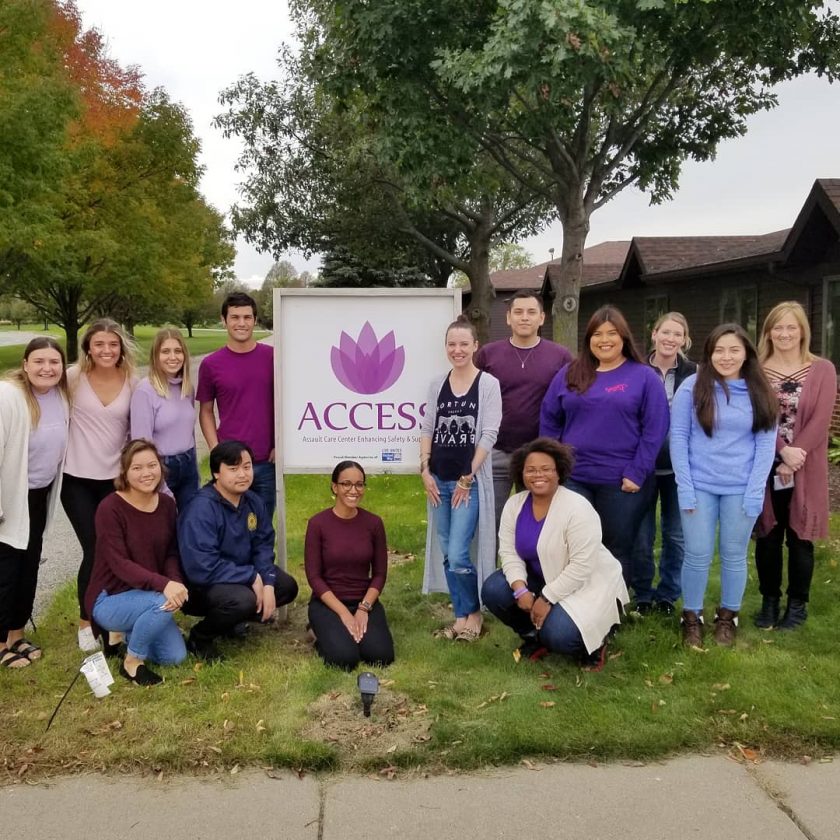ACCESS here to help

Staff members of ACCESS take a picture together prior to the start of COVID-19. ACCESS works with five counties including Story, Boone, Greene, Marshall and Tama. Photo provided
Domestic and sexual abuse are two things people hope they never have to go through. In the event one does it is imperative to have resources to reach out to.
Assault Care Center Extending Shelter and Support or ACCESS is a victim service agency that helps survivors of domestic and sexual abuse. ACCESS offers many services that seek to help those find social justice. All services are free and confidential.
ACCESS was founded due to the need to confront and combat issues of sexual assault and domestic violence in Story County. It orignally began in 1976 as a rape crisis center and has now expanded to include a 24-hour crisis hotline and shelter for victims of domestic violence and their children.
Services offered include a 24/7 crisis line and response, short term counseling, housing specific programs for victims of domestic abuse, stalking/harassment, sexual abuse, homicide and violent crimes.
In 1981, the first shelter facility, a place where survivors and children could share a safe environment and more readily receive the services their growing staff and volunteers were ready to provide. ACCESS continues to serve Story, Boone, and Greene, Marshall & Tama counties. Offices are located in Boone, Ames and Marshalltown.
The philosophy of ACCESS is that domestic and sexual violence are perpetuated by a societal structure that reinforces inequity in gender roles, relationships, and the distribution of power. Inequity and violence cannot be tolerated. ACCESS believes that systemic change begins with education, advocacy, and crisis care focused on the needs of the individual.
ACCESS provides counselors that are licensed by the State of Iowa and are trained in working with victims. Many have a social work degree or a degree in crisis counseling.
ACCESS counselors are there for victims in a multitude of ways. Counselors from ACCESS can enter a victim’s healing process at any stage. That means it could mean a counselor showing up at the hospital right after a domestic violence event or a person’s abuse could have happened during their childhood and the victim is now ready to address those concerns as an adult.. Victims do not have to have recently gone through an abuse event to seek ACCESS’s services. Counselors are there to help work through paperwork while victims process emotions.
While some who seek to work with ACCESS have been referred by law enforcement or the county attorney’s office, individuals may also advocate services for themselves. It’s also important to note victims can work with ACCESS without reporting to law enforcement.
As COVID-19 numbers continue to climb to all time highs, people are spending more time at home.
ACCESS counselors are seeing spikes in domestic abuse cases as a result.
More time at home can also result in re-traumatization. Lydia Wolken, a rural sexual abuse advocate said people are spending more time in their own heads and may experience re-traumatization from a childhood event.
No matter where a victim is at in their recovery, ACCESS is there to provide free and confidential services.
Many ACCESS counselors are survivors themselves and while the work is hard it’s also why they continue to do the work. Counselors need a good support system outside of work to return every day.
There will be a virtual support group for victims starting in April.
If you are in need of help here are the hotlines numbers:
Sexual Abuse Crisis Line: 515-292-5378 or Toll Free 800-203-3488
Domestic Violence Crisis Line: 515-292-0519 or Toll Free 855-983-4641
Housing/Sheltering Services Crisis Line: 515-292-0543 or Toll Free 855-696-2980
ACCESS Business Line: 515-292-0500 or Fax 515-292-0505






